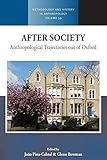After Society : Anthropological Trajectories out of Oxford / ed. by Glenn Bowman, João Pina-Cabral.
Material type: TextSeries: Methodology & History in Anthropology ; 39Publisher: New York ; Oxford : Berghahn Books, [2020]Copyright date: ©2020Description: 1 online resource (232 p.)Content type:
TextSeries: Methodology & History in Anthropology ; 39Publisher: New York ; Oxford : Berghahn Books, [2020]Copyright date: ©2020Description: 1 online resource (232 p.)Content type: - 9781789207682
- 9781789207699
- 301 23
- online - DeGruyter
| Item type | Current library | Call number | URL | Status | Notes | Barcode | |
|---|---|---|---|---|---|---|---|
 eBook
eBook
|
Biblioteca "Angelicum" Pont. Univ. S.Tommaso d'Aquino Nuvola online | online - DeGruyter (Browse shelf(Opens below)) | Online access | Not for loan (Accesso limitato) | Accesso per gli utenti autorizzati / Access for authorized users | (dgr)9781789207699 |
Frontmatter -- CONTENTS -- INTRODUCTION. AFTER SOCIETY -- PART I The Oxford Experience and Beyond -- Chapter 1 PLODDING TOWARDS PROSOPOGRAPHY: OXFORD ANTHROPOLOGY FROM 1976 ON -- Chapter 2 AMOR FATI AND THE INSTITUTE OF SOCIAL ANTHROPOLOGY -- Chapter 3 THE LUCKY ANTHROPOLOGIST? BECOMING AN ANTHROPOLOGIST OF JAPAN AT OXFORD -- Chapter 4 LOST AND FOUND AT OXFORD -- Chapter 5 IS NECESSITY THE MOTHER OF INVENTION? -- PART II Ethnography as a Vocation -- Chapter 6 CHANGING QUESTIONS? REFLECTIONS ON SOCIAL ANTHROPOLOGY IN AND OUT OF OXFORD SINCE THE 1980S -- Chapter 7 THE FIELDWORK TRADITION AND THE QUEST FOR ESSENTIAL PERPLEXITIES -- Chapter 8 JOURNEYS OF AN ETHNOGRAPHER: FROM OXFORD TO THE FIELD AND ON TO THE ARCHIVES -- PART III Why Anthropology? Concluding Remarks -- Chapter 9 WHY ANTHROPOLOGY? STRUCTURALISM AND SINCE -- Chapter 10 FROM OXFORD TO CAMBRIDGE CHASING THE ‘AKA’ -- Chapter 11 MEDITERRANEAN EQUIVOQUES AT OXFORD -- INDEX
restricted access online access with authorization star
http://purl.org/coar/access_right/c_16ec
In the early 1980s, when the contributors to this volume completed their graduate training at Oxford, the conditions of practice in anthropology were undergoing profound change. Professionally, the immediate postcolonial period was over and neoliberal reforms were marginalizing the social sciences. Analytically, the poststructuralist critique of the notion of ‘society’ challenged a discipline that dubbed itself as ‘social’. Here self-ethnography is used to portray the contributors’ anthropological trajectories, showing how analytical and academic engagements interacted creatively over time.
Mode of access: Internet via World Wide Web.
In English.
Description based on online resource; title from PDF title page (publisher's Web site, viewed 25. Jun 2024)


